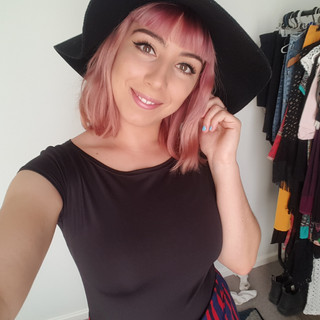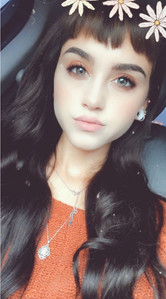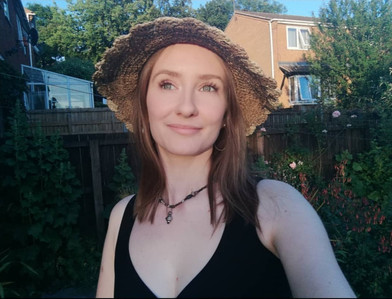The many faces of Autism
- Amber Tartaglia

- Apr 1, 2020
- 9 min read
Updated: Oct 28, 2020
Hi, my name is Amber. If you know me personally it may (or may not) come as a surprise to learn that I am Autistic. The term Asperger’s Syndrome has been replaced with a broad Autism Spectrum Disorder (ASD) term, encompassing several previous distinct disorders when the most recent diagnostic manual was published in 2013. Seeing as it is Autism Acceptance Month I thought I would share some of my story, to help break down stigma or misunderstanding.
I was diagnosed on the 21st of February, 2020 at the age of 25. One might ask the question "How did you not know all this time?"
Or you might be confused, as I don't necessarily fit the idea you had of Autism. Well let me explain.
@my_unsecret_diary
Autism is a different way of seeing, perceiving and interacting with ones world.
Autism is a life long Neurological condition (basically our brains are wired differently). Autism is defined by a certain set of behaviours and is a “spectrum condition” that affects people differently and to varying degrees. This video does a good job at briefly explaining it.
Youtube: yo samdy sam

You can read the official diagnostic criteria here. The diagnostic criteria is hard to understand at first, it wasn't until I read this document by a psychologist named Tania Marshall called Moving towards an adult female profile of Autism/Asperger Syndrome and watched this video What women with Autism want you to know that a light bulb went on above my head. It made sense on a whole other level. Like real life situations and examples, most of which really explained my entire life experience. It was a surreal moment.
Cue Light bulb moment

Based on the way Females are conditioned socially, they learn very quickly how to play the part and "act normal"from lived experiences of bullying, and keen observation of how others act, so they go under the radar. They still share the exact same traits as males, but they just show them in a different, less stereotypical way and it is much more of an internal thing.

Non-Autistic people act in an Autopilot kind of way. They say what they say, do what they do, generally with little thought about it. Autistic people, however, act manually. Before they do or say anything, they think into it and make sure it won't make them seem weird or get them into trouble.
”Any time you have a conversation with me, I’ll be analysing and examining our chat from every angle. Did I do well? Did I talk too much? Did I not talk enough? Every faux pas, every accidental insult, feels like a personal failure, like an irrevocable mark of shame on my record.”
Autistic Masking is a very emotionally and mentally draining thing to do. Imagine constantly being aware of every part of your body, your facial expressions, tone of voice, trying to adjust it to be just so. Trying to fit in and not stand out. But it seems that no matter what, we stand out as being a little bit socially awkward, shy, avoidant, maybe even weird. The fact that we live in a majority Neurotypical society, means we are often disabled by our environment and the societal expectations placed upon us. Constantly pushing a square peg through a round hole leads often times to depression and burn out.

We Autistics are all VERY different, but Something that we all have in common, is that we always knew we were different, but we just could never figure out why! We can make friends, but we can't maintain friendships. Social stuff just doesn't make much sense to us. We speak a different language, almost. We always feel we are on the outside looking in, observing from the sidelines. Most of the time this is by choice, but other times we want to be included, and we try really hard, but it just doesn't come naturally.
Most people would assume being diagnosed Autistic is like a life sentence, something negative. But for myself it is the best thing that could have possibly happened to me. I was Autistic the entire time, anyway, but actually being aware of it is life changing. I'm not an alien, I'm not broken, I'm not weird. I am just me. I’m not so hard on myself, anymore. I accept my struggles, and feel valid in them. I appreciate my strengths a lot more, too. Now I have a guide with which I can continue on.
I suddenly fell into this other dimension where all of these wonderful humans resided, somewhere where I could finally fit in and belong. I went from feeling like no one gets it to having hundreds of people online (and some in real life) who do! I am not alone any more. That is the greatest gift this diagnosis has given me.
I’d like to point out that not everyone can afford the diagnosis or it just isn’t the right choice for them to persue it. But I feel if you identify as Autistic then that is 100% valid. When you know, you know. You know?
There are many faces of Autism
And I am proud to be one of them.
So what does this all mean for me? Being Autistic means I am very sensitive, emotionally, intuitively, energetically and to environmental stimuli such as light, sound and touch. I don't like people to get too close to me. I get extremely exhausted after I go to the shopping or spend time with people. My brain can't filter out the background stimuli, but takes it all in at the same time. Everything is louder, brighter, just more intense. I guess that's why I don't like to expose myself to certain situations I know I'll be uncomfortable in.
It kind of feels like being a banana without a skin. Bare and vulnerable to the worlds noise and chaos, confused by the social game, deeply affected by the injustice of the world. I need more time to process things. I have trouble with social reciprocity, which means back-and-fourth conversation is difficult sometimes. Small talk seems "pointless". Get togethers need a function or I feel anxious and lost.
Certain deficits in verbal and non-verbal social communication like animating my voice or face, lacking use of gestures. You might ask me a question and I’ll give you the bare minimum of an answer. I also have troubles developing, maintaining and understanding relationships, as well as being uncertain how to act in various social contexts. It’s very hard for me to regulate my emotions.
Autistic people have “Rigid and specific interests” also known as special interests. Having intense passions about particular subjects help us through life. I gain immense joy from part taking in my special interests: Birds, animals and art. Back when I was a teenager my special interests were bands. The interests can be similar to other people your age and not seem to stand out, the difference is the intensity and the amountof knowledge we can obtain. .

I know some elements of all this might sound very gloomy, but along with some struggles come good things, too. I always stand up for the under-dog and defend others, I have a strong sense of justice. This is probably the reason why many Autistic people are activists. I can see to the depths of human nature and I’m a little bit psychic. Yes, I find it hard to connect with individuals sometimes, but only in the traditional or superficial sense; I can connect with people in more of an unspoken way. I connect very deeply with the natural world. I am extremely truthful and can sometimes be blunt. (which may not sound like a good thing, but I think it is). I value truth above all else.
I can sit for hours and hours learning about things that interest me. I love to observe the way the world works and analyse people and things.
I see the world as art, I see the shapes, patterns and colours, everything I do is a creative pursuit. Yes, sometimes over-stimulation can be too much, but I can also perceive the world in a more vivid and beautiful way. I love the way I can enjoy my own company. I have a really good eye for detail and notice a lot of the small things, and the small things make me the happiest.
I love that I don’t need to follow the crowd, and I stand proud of my beliefs and try to carve my own path.
Once you've met one Autistic person, you've met one Autistic person
I'd like to mention- just because someone is Autistic does not mean they will be just as I’ve described above. I am speaking from my own point of view, the Spectrum is vast!
There are many myths and untruths about ASD, and now I am officially a part of this Spectrum community, it feels like my duty to help in anyway way possible, to break down these painful stigmas.
Myths about Autism:
-Autistic people don't have feelings. No, that's pretty much impossible for any human being, one would think? The truth is, we tend to be hyper-sensitive and empathetic, so we feel ALOT but just don't tend to show that outwardly. And we can struggle to explain how we feel.
-Autistic people are all Males
False.
The ratio is said to be 3:1 male>female.
-Autistic people have learning disabilities
Some do, some don't. Autism alone, is Autism, it does not have anything to do with cognitive abilities. However, there can be co-existing conditions. These conditions can exacerbate features of autism or affect the timing of an autism diagnosis. Many people, particularly women are misdiagnosed with other mental health conditions.
The conditions that overlap with autism generally fall into one of four groups: classic medical problems, such as epilepsy, gastrointestinal issues or sleep disorders; developmental diagnoses, such as intellectual disability or language delay; mental-health conditions, such as ADHD, obsessive-compulsive disorder or depression; and genetic conditions, including fragile X syndrome and tuberous sclerosis complex.
Vaccines cause Autism-
False.
Current research suggests that autism cannot be explained by a single cause, but is probably due to a combination of developmental, genetic and environmental factors.
Autistic people are genius's
Some are! But the majority of us, although talented, aren't savant genius's.
Some Public Figures on the Spectrum-

Greta Thunberg
17 year old Climate Activist who started the School Strike For Climate movement. She is very open about her Aspergers Syndrome. I believe her Aspergers is what gives her such strong focus and passion for Climate, and seeing deep into the truth of humanity.

Chris Packham
An English naturalist, nature photographer, television presenter and author, best known for his television work including the children's nature series The Really Wild Show. Chris is extremely knowledgeable and passionate about animals. Chris's Documentary "Asperger's and me".

Dan Aykroyd
The international movie star was diagnosed in the 1980's. One of his special interests are ghosts, which he said helped him create the film Ghost busters.

Pip "Ladyhawke" Brown
New zealand singer who sais "Some people don’t even realise that they have it. I went through my whole life not knowing until only a few years ago, when it was just doing my head in and I had to get help."
She describes herself as a quiet, wallflower student" who "excelled at design and woodwork and arty subjects".

Satoshi Tajiri
A Japanese video game designer and director best known as the creator of Nintendo's Pokémon franchise.
Growing up, Satoshi developed an intereset in bugs and studied their behaviour & characteristics. It is said that his relentless drive and focus come from his Aspergers.

Courtney Love
American singer, song writer & actress who rose to prominence as the front woman of the band Hole formed in 1989.
She admits to being a fan of aforementioned Ladyhawke.

Tim Burton
Director Tim Burton has not yet been medically diagnosed, but both he and his wife, actress Helena Bonham-Carter believe he may have Asperger's Syndrome. According to Carter, she experienced an “a-ha moment” while researching an autistic character for a film. “Autistic people have application and dedication. You can say something to Tim when he’s working and he doesn’t hear you. But that quality also makes him a fantastic father, he has an amazing sense of humour and imagination. He sees things other people won’t see.

Temple Grandin
American professor of animal science at Colorado State University, consultant to the livestock industry on animal behaviour, and autism spokesperson.
I would hope that from reading this blog, you will change the lense with which you view Autism. I sure have. I am grateful and proud to be a part of this community, full of awesome, dedicated and talented human beings. I truly believe if I did not find this out about myself, life would have been a really hard one. I have a new appreciation for myself, just knowing I have a different kind of Neurology helps me get through tough situations.
I hope I can slowly start to Help you understand the way in which we communicate, because understanding breeds compassion.
This is my Truth. Thank you for reading. #mygoldenmoment #ourgoldenmoment #redinstead
Thank you to all the wonderful people who let me include their photograph or info graphic, you have all helped me put my point across where words failed.
More information:
The psychologist who did my assessment has some input in this article:
Instagram users featured:
@Autisamber
@Laylaelyzabeth
@The_aspie_perspective
@dollyautie
@unmasking.asd
@audaciousautie
@neurodivergentwitch
@mjfitzarrow
@anxious_pancreas
@rhiannontheaspie
@blacklodgeadmiralty
@artsieaspie
@aspiefaerie
@morganraven13
@ellaishtar
@letstalkaboutautism
@aspienelle
@_nerdiam_
@autistic_alchemy
@laurazdan
@naturally_ally17
@whalespiel
@laylaelyzabeth
@anita.as[erger
@unu_aurora
@dynamitejetmoom
Instagram infographic credit:
@autisticwellbeing
@theresascovil
Rebecca Burgess (What does the Autism Spectrum look like?)
@neurodiversity_ot
@thechameleon.asd
@the.chronic.couple
@theneurodiversewoman
@neurodivergentrebel
@theaspielife_
@aspergirl
@planetneurodivergent
@omgimautisticaf
@my_unsecret_diary












































































































Bonjour Amber, merci infiniment pour ce témoignage d'une sincérité désarmante. La façon dont vous décrivez le "masking" et l'épuisement social qui en découle est extrêmement précise et touchante. Ce moment d'illumination ("light bulb moment") que vous avez vécu à 25 ans est crucial ; il permet enfin de ne plus se voir comme "cassé", mais simplement comme différent.
Vous avez tout à fait raison de souligner que le diagnostic officiel n'est pas toujours accessible à tous, que ce soit pour des raisons financières ou logistiques. Pourtant, la validation de ses propres ressentis est une étape essentielle pour arrêter de culpabiliser et commencer à mieux vivre avec sa neuroatypie.
C'est dans cette optique d'aide à la découverte de soi que je…